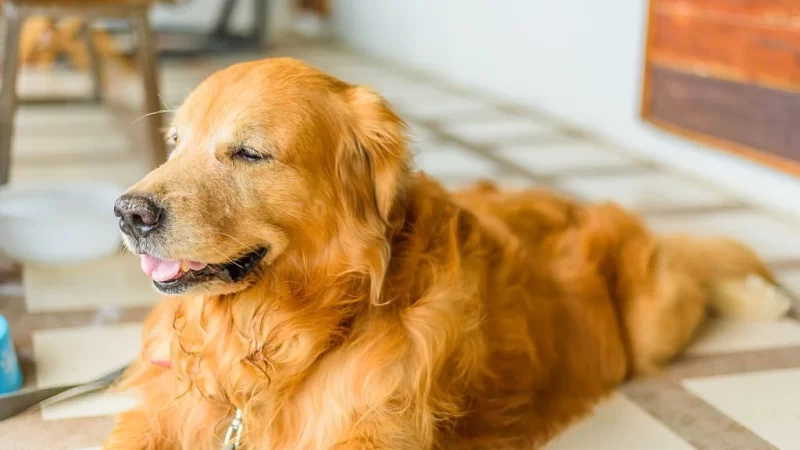Why Is My Dog Throwing Up Undigested Food? 8 Reasons & Treatments

Why is my dog throwing up undigested food? Have you ever given your dog food after exercise, then a little while later he spat it out on the ground? How about if your dog eats and then promptly vomits up a tube of mucous afterward?
This is referred to as regurgitation. and the digestive system of your dog does this on a regular basis.
Why Do People Regurgitate?
Bringing up undigested food when your dog regurgitates. It primarily originates in the esophagus and travels up into the mouth and out.
For dogs, it’s a typical procedure. But, in the heat of the moment, you could experience anxiety. This is particularly true when there is a grey area between vomiting and regurgitation.
Let’s briefly cover vomiting and how it differs from regurgitation before going into further detail about regurgitation.
Is Your Dog Vomiting Or Regurgitating?
These are some significant distinctions between vomiting and regurgitating.
Regurgitation
Regurgitation serves as a correction. Abdominal heaving does not occur when someone regurgitates.
The esophagus of a dog makes evacuation simple. Also, the food that your dog vomits will resemble what it did while it was in his stomach. Undigested food is regurgitated.
Vomiting
Your dog will vomit up any harmful or undesired substances. Often, it’s a symptom of a gut imbalance. Dogs’ small digestive systems enable quick toxin elimination.
You may notice symptoms of nausea in your dog, such as increased drooling and lip-smacking. Perhaps the familiar confused, anxious vomit look.
Vomiting originates in the upper intestines and stomach. Vomit contains largely digested food together with bile and froth, unlike food that has been regurgitated.
Its texture, color, and scent are distinctive. Your dog will often do the four-on-the-floor brace as he vomits the contents of his stomach.
Burping OR Too Much Acid
Burping and regurgitation are sometimes mistaken terms. and the stomach is where everything starts. Little portions of meals may cause gas. Several things may cause someone to burp.
- Emotional distress
- The absence of any other secretions or hydrochloric acid
- Excessive food fermentation in the stomach
- Inflammation
Burping, though, is a subject for another day. then let’s resume regurgitating.
Recommended: Why Is My Dog Throwing Up Blood? 15 Causes & Treatments
Hurling Up Unfinished Meals
Regurgitation may be simply defined as your dog bringing his food back up immediately after eating it. Fluids may also experience this. with your dog gushing water after taking a large sip.
Regurgitation may happen right once or gradually over the course of an hour. When often depends on what your dog consumed.
handmade prepared kibble, processed raw kibble, conventional raw kibble, and bone. Regurgitation is more likely with chews and bones.
If the bone or chew is too large for your dog to swallow, he will evacuate them if they don’t fit properly in his stomach.
Your dog will just bring anything too big he eats back up. The ejected materials are often mucus-covered, glued together, and virtually entirely undigested.
It’s disgusting, but it’s entirely usual for your dog to eat his vomited food again. He could first break it up into tiny pieces.
When given kibble, your dog can vomit compacted, mucus-covered kibble bits that resemble his esophagus! Saliva and mucus help food pass more easily past the esophagus and into the stomach when your dog swallows.
For Your Dog’s Undigested Food Throw-Up | 8 Reasons
Your dog’s body has a natural mechanism for regurgitation. The reasons for regurgitation might differ. Thus, it’s a good idea to maintain a health log if your dog often regurgitates. Note a few details, such as…
- What your dog consumed?
- How quickly was he reabsorbed?
- Was he worried or anxious?
- What it seemed to be?
- What the fragrance was?
You can spot any trends using the notebook you keep.
Here is a list of potential causes for your dog’s increased propensity to regurgitate.
- Worry and dread
- An anxious or worried stomach
- Unpleasant ingredients or consistency
- Eating too rapidly
- consuming water too quickly
- Eating too soon after working out
- Esophageal inflammation
- Using an incubator during surgery (can irritate the esophagus temporarily)
How To Make Your Dog Quit Throwing Up Food?
You may attempt a few different tactics to try to stop your dog from making food vomit.
- Provide The Proper Bone Sizes
- Infuse Kibble
- Speed Him Up
Let’s discuss these points:
Provide The Proper Bone Sizes
It’s typical to regurgitate bones. Regurgitation might be triggered by raw meaty bones or recreational bones.
Your dog could take them completely if he’s a gulper. bring them back up again in a hurry, coated with goop.
Always make an effort to offer bones that are the right size. Also, never feed fried, smoked, or raw hides.
Infuse Kibble
If you give any kind of kibble or compacted meal, consider soaking it for at least 10 to 15 minutes in warm water.
For a more nourishing method of doing this, you may also use bone broth. Moisture might aid your dog in swallowing the food.
Speed Him Up
It’s important to teach your dog to eat slowly if you want to stop frequent regurgitation. This is crucial while eating kibble or other tougher meals.
Bowls or platters for leisurely dining come in a wide variety. Using one may significantly slow down your dog.
Smaller meals might be given many times during the day. A higher dish for feeding might be helpful.
Typically, just reheating your dog’s food will prevent regurgitation. or allow it to warm up before feeding it.
When Should You Discuss Regurgitation With Your Vet?
Regurgitating unprocessed food is often not a cause for concern. Regurgitation may sometimes be a symptom of a more severe ailment, however, this is unusual. The following scenarios call for consulting your veterinarian.
When your dog can’t keep any food or liquids down for more than a few seconds and it occurs more than once or twice a week, it is known as chronic regurgitation.
Consult your veterinarian if your dog routinely regurgitates fluids. It could be brought on by a constriction of the canal or an anomaly in the esophagus. Dogs may also get esophageal cancer and obstructions.
In rare circumstances, regurgitation might result in aspirated pneumonia. That implies that your dog inhales food fragments into his lungs.
It often occurs in dogs with short muzzles, such as Boston Terriers, Bulldogs, and Pugs. Regurgitation is often prevented by the flap or sphincter that divides the esophagus from the stomach.
Yet sometimes, the stomach or your dog’s response to reflux might drive this flap open. The mucosal lining becomes inflamed and deteriorates as a result.
Addison’s illness
This may lead to persistent regurgitation. An autoimmune condition called Addison’s causes the adrenal glands to generate too little cortisol.
Megaesophagus (ME)
Is a different condition that results in persistent regurgitation. Miniature Pinschers and Yorkies are predisposed to this problem.
Because of weakened esophageal muscles caused by ME, food does not pass through to the stomach as it should.
Dogs with ME must eat while seated so that gravity can help the food pass down the throat.
See your veterinarian if your dog’s regurgitation is accompanied by appetite loss, drowsiness, constipation, or diarrhea.
Understanding the distinctions between regurgitation, burping, and vomiting is crucial. Keep in mind that regurgitating is often quite natural.
But, consult your vet to rule out any severe conditions if your dog often vomits up undigested food.














